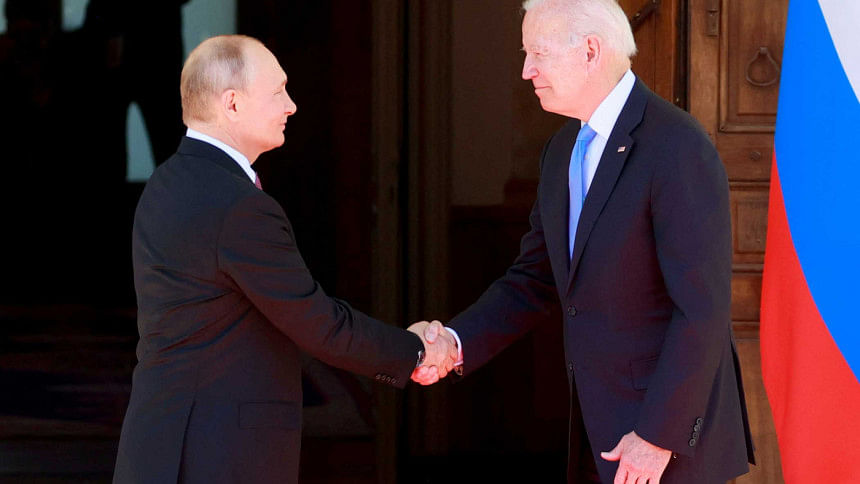Is Ukraine collateral damage for the US?

In 1985, at the height of the Cold War, Hollywood produced a movie called "Rocky IV", a typical good-American-bad-Russian story. It revolves around a boxing battle between Ivan Drago, a six-foot-four, 261-pound fighter from the erstwhile Soviet Union, and Rocky Balboa, an American boxer. Drago is a killing machine, trained with high-tech equipment and regular doses of anabolic steroids. Rocky, on the other hand, is a humane person, trains in deep snow over mountainous terrains utilising antiquated farm equipment.
Although Rocky is no match for Drago in physical strength, he eventually wins through sheer grit. That was the time of the Cold War. The Washington-led North Atlantic Treaty Organization (NATO) and Moscow-led Warsaw Treaty faced off each other, fuelled proxy wars, toppled governments, and tortured political activists all over the world. Both treaties or forces claimed to be defence arrangements.
In 1989, the Soviet Union collapsed, leaving the USA as the sole superpower. The Warsaw Treaty followed suit, and NATO had no one to defend itself against. In his 1992 book, "The End of History and the Last Man," American political scientist Francis Fukuyama wrote that humanity had reached the endpoint of ideological evolution and the universalisation of Western liberal democracy as the ultimate form of human government. Many thought that NATO's reason for being was over, and it would soon become irrelevant, especially because it was formed with the Soviet Union as its stated enemy.
But NATO not only continued to exist, but also expanded eastward towards Russian borders despite its commitment not to do so. Washington actively carried on with its aggressive, interventionist approach including establishing military bases in far-off countries. The US military needed to strike the first blow by deploying armed force at a distance, as Professor David Vine at the American University in Washington, DC states in his book "The United States of War". War is ingrained in Washington's foreign policy, and by granting NATO membership to Eastern European countries, it has craftily lured Putin into invading Ukraine—a godsend for the USA as it can now repair its pride damaged in Afghanistan. Those who criticised Joe Biden for the haphazard retreat there now realise that his eyes were on Ukraine, the next theatre of the global war.
The Ukraine saga has made Washington the global conscience, a role poles apart from the previous one it notoriously earned in Iraq, Syria, Libya, and many other countries. But there are more rewards that its corporate elites are going to reap.
Huge amounts of capital have left the Chinese and European markets since Russia's Ukraine invasion. Many foreign investors have recently sold off their Chinese government bond holdings. USD 23.4 billion in stock funds has left Western Europe soon after the invasion. Meanwhile, investors have put USD 40.5 billion into US stock funds over recent weeks, according to The Wall Street Journal.
Crude oil price reached USD 139 a barrel at one point—the highest level for almost 14 years—while wholesale gas prices for next-day delivery more than doubled. That will nicely feed into the corporate profit of the global oil giants.
Then, there is the lucrative European hydrocarbon market which Russia has long benefitted from. In 2021, Europe bought about 81 percent of all Russian exports. The sanctions imposed after Ukraine invasion will put a big dent in it. By contrast, for the USA, which is producing gas at a record level but doesn't have buyers, Europe is a potential customer that can pay premium prices once the Russian supply stops. The European Union has already signed a deal with the USA for purchasing Liquefied Natural Gas (LNG) that will significantly reduce its dependence on Russian supply.
Europe will also turn to the USA for advanced defence equipment. The most notable is Germany, which for years played down the role of its military in foreign policy. It has already raised its defence spending by 100 billion euros and plans to spend over 2 percent of GDP on this sector. The Ukraine situation has created a sense of insecurity that will only increase Europe's defence spending, benefitting the American military-industrial complex.
Looking at the global scenario, China is the third player in this conflict, albeit still a silent one, anxiously watching the developments. It has refused to condemn Russia for the Ukraine invasion and is critical of NATO's eastward expansion. Beijing can't miss that NATO is closing in on China's western borders and the Central Asian region. It is already wary of the recently formed Quad and the trilateral security pact between Australia, the United Kingdom, and the USA (AUKUS), as both strengthen American military presence in the Asia-Pacific region.
Washington's Afghan adventure, partly motivated by its intention to control the Eurasian heartland, ended in a dismal failure. Biden is now on a more ambitious mission that includes encircling both Russia and China. Ukraine is just collateral damage in this geopolitical game.
Dr Sayeed Ahmed is a consulting engineer and the CEO of Bayside Analytix, a technology-focused strategy and management consulting organisation.

 For all latest news, follow The Daily Star's Google News channel.
For all latest news, follow The Daily Star's Google News channel. 



Comments